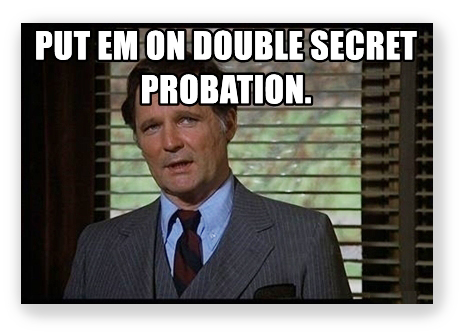We post news and comment on federal criminal justice issues, focused primarily on trial and post-conviction matters, legislative initiatives, and sentencing issues.

DOUBLE SECRET PROBATION
 From the Second Circuit comes a remarkable decision, one that should cause any number of Second Circuit defendants to wonder whether as well might have been victims of a Star Chamber process that brings to mind Dean Wormer’s “double secret probation.”
From the Second Circuit comes a remarkable decision, one that should cause any number of Second Circuit defendants to wonder whether as well might have been victims of a Star Chamber process that brings to mind Dean Wormer’s “double secret probation.”
Three defendants were convicted of murder-for-hire and related drug crimes in the Southern District of New York. Long after they filed their appeals, the Narcotic and Dangerous Drug Section (“NDDS”) of the US Dept of Justice filed a notice with the 2nd Circuit advising it that the District Court had entered a sealed protective order – based upon the NDDS’s secret request that it do so – which barred both the US Attorney’s Office and the defendants from reviewing documents containing some pretty juicy but super-secret stuff. Exactly what it was we don’t know, because it was (did I tell you this?) it was super-secret.
The District Court had issued the sealed protective order pursuant to the Classified Information Procedures Act (18 USC Appx. 3 §§ 1 et seq. and F.R.Crim.P. 16(d), granting an ex parte motion by an NDDS attorney (which means that no notice was given to the US Attorney or defense counsel).
 After the Court of Appeals panel learned of the sealed document, it ordered NDDS to demonstrate why at least the motion and memorandum of law, the exhibits that support the motion, and the protective order should not be disclosed to the US Attorney for his review. NDDS predictably told the Court the US Attorney should not be trusted to even know the legal basis for the sealing, let alone with what it was that was sealed. That did not go over well with the 2nd Circuit, which vacated the District Court’s protective order, not only telling the NDDS to turn everything over to the US Attorney, but ordering the US Attorney to justify not turning it over to the defense.
After the Court of Appeals panel learned of the sealed document, it ordered NDDS to demonstrate why at least the motion and memorandum of law, the exhibits that support the motion, and the protective order should not be disclosed to the US Attorney for his review. NDDS predictably told the Court the US Attorney should not be trusted to even know the legal basis for the sealing, let alone with what it was that was sealed. That did not go over well with the 2nd Circuit, which vacated the District Court’s protective order, not only telling the NDDS to turn everything over to the US Attorney, but ordering the US Attorney to justify not turning it over to the defense.
The US Attorney claimed for several reasons that the protected material and the sealed proceedings should not be disclosed to the defense. The Circuit nevertheless ordered the US Attorney to turn over any Brady material to the defense while the panel considered arguments on whether the rest should be disclosed as well.
In light of the materials disclosed pursuant to the Brady order, the Defendants raised an additional Brady challenge to their convictions, specifically, that the prosecution withheld exculpatory information in violation of Brady v. Maryland.
On Wednesday, the Circuit declined to consider the Brady argument, sending the whole mess back to the district court. First, the 2nd held, there was no record below on the Brady claims. True, the Circuit said, the defendants could not have raised it before because it was kept secret, but still, an appellate court is a court of review, and it needs a record to review.
There was a second, practical reason, the Court said. Under F.R.Crim.P. 33(b), a defendant has three years from the verdict to file a motion for a new trial. That deadline is only three months away. It makes more sense to send it back to the trial court, where the “Defendants’ allegations concerning the previously undisclosed material, if true, are relevant to the establishment of cause for a new trial.”
 Ominously, the 2nd Circuit suggested in a footnote that this may not be NDDS’s first rodeo. “To the extent the NDDS or similar entities may have obtained similar ex parte sealed protective orders against all parties in other criminal cases in this Circuit, district courts may wish to consider whether such orders should be maintained in light of this decision. In order to permit effective review, any decision to enter or maintain such an ex parte sealed protective order against all parties should be supported by a clear statement of reasons, including specific reasons why disclosure cannot be permitted even as to the pertinent U.S. Attorney in the first instance.”
Ominously, the 2nd Circuit suggested in a footnote that this may not be NDDS’s first rodeo. “To the extent the NDDS or similar entities may have obtained similar ex parte sealed protective orders against all parties in other criminal cases in this Circuit, district courts may wish to consider whether such orders should be maintained in light of this decision. In order to permit effective review, any decision to enter or maintain such an ex parte sealed protective order against all parties should be supported by a clear statement of reasons, including specific reasons why disclosure cannot be permitted even as to the pertinent U.S. Attorney in the first instance.”
United States v. Stillwell, Case Nos. 18-3074-cr et al., 2021 U.S. App. LEXIS 2206 (2d Cir. Jan. 27, 2021)
– Thomas L. Root

